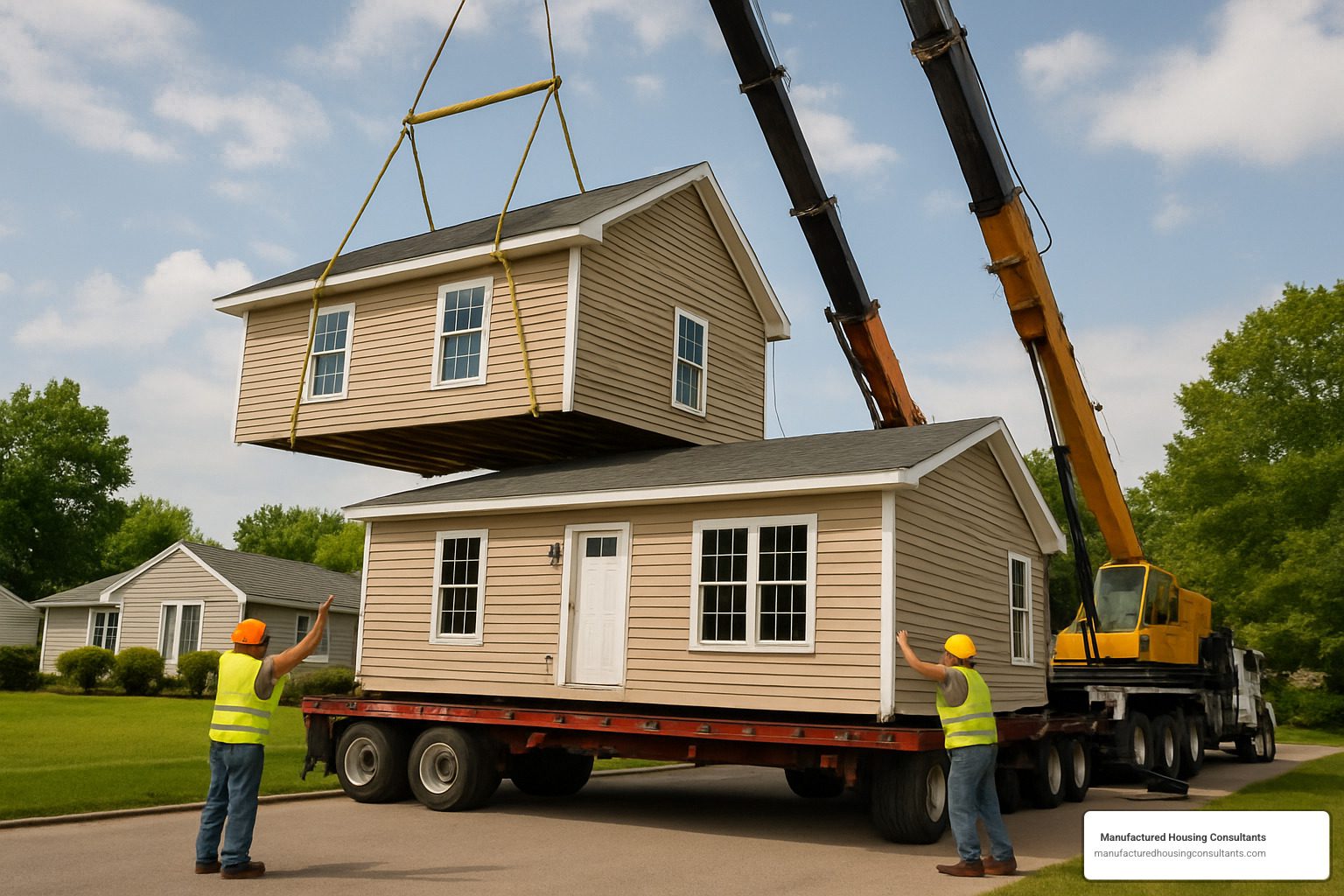The Smart Path to Affordable Homeownership
If you’re looking for prebuilt homes delivered to your property, here’s what you need to know:
- Timeline: Most prebuilt homes can be delivered in 6 weeks to 9 months after ordering
- Cost Range: $25,999 to $176,568 depending on size and features
- Delivery Area: Available throughout Texas with specialized delivery services
- Assembly Time: Can be set up and weather-tight in as little as one weekend
- Types Available: Single-wide, double-wide, modular, expandable, and tiny homes
Prebuilt homes delivered to your location offer a smart alternative to traditional construction, combining affordability with speed and quality. Factory-built in controlled environments, these homes arrive ready to place on your prepared site—saving you months of construction headaches and weather delays.
The housing market in Texas continues to challenge many families and individuals seeking affordable options. With traditional home prices climbing beyond reach, prebuilt homes provide a practical path to homeownership without sacrificing quality or customization.
“It isn’t time to reinvent the wheel; it’s time to refind it,” as one yurt manufacturer puts it—and the same applies to modular and manufactured housing. Today’s factory-built homes bear little resemblance to the mobile homes of decades past. Modern prebuilt homes feature energy-efficient designs, durable materials, and stylish finishes that rival site-built construction.
What makes prebuilt homes particularly attractive is their combination of upfront cost savings and long-term value. With prices starting around $25,999 for single-wide models and ranging up to $176,568 for larger custom designs, there’s an option for nearly every budget. Many manufacturers offer financing assistance, making the dream of homeownership accessible even to those with challenging credit situations.
The process is remarkably straightforward: select your model, customize features to fit your needs, prepare your site, and receive delivery of your new home—often in a fraction of the time required for traditional construction.
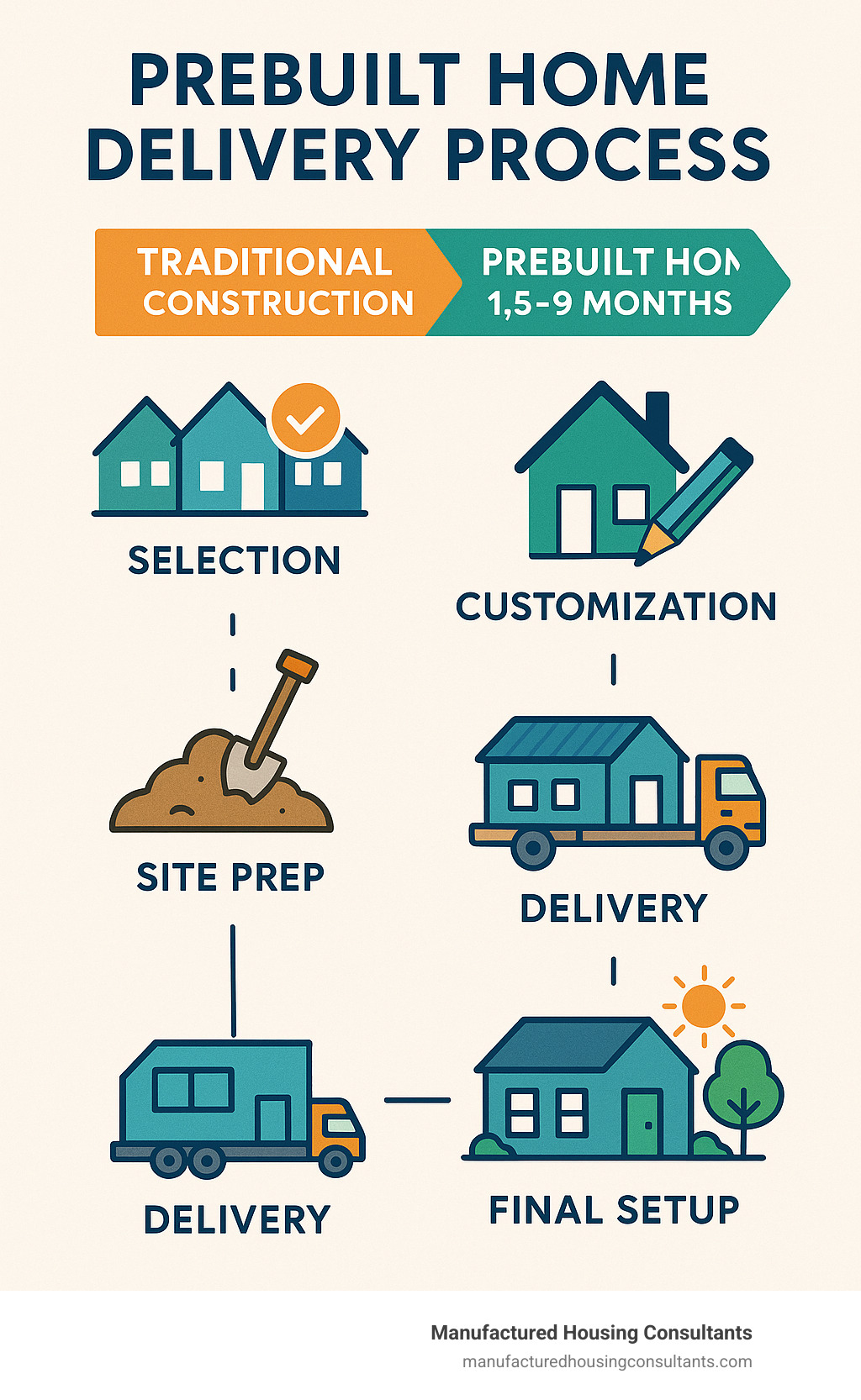
Prebuilt homes delivered helpful reading:
Understanding & Choosing Your Prebuilt Home
What Are Prefab Homes and How Do They Differ?
Prebuilt homes (also called prefabricated or prefab homes) are dwellings manufactured off-site in sections or modules within a controlled factory environment. These modules are then transported to your property and assembled on a prepared foundation.
Unlike traditional stick-built homes that are constructed piece by piece on-site, prebuilt homes delivered to your location arrive mostly complete. The factory setting provides significant advantages:
The controlled environment means consistent quality control throughout the building process. No more worrying about rain soaking your lumber or snow delaying your project for weeks. Inside these factories, materials stay protected and work continues regardless of what Mother Nature is doing outside.
Workers in these facilities specialize in specific tasks, becoming experts at their particular role in the building process. This specialization leads to greater efficiency and higher quality work. Plus, each home undergoes multiple inspections during manufacturing – far more quality checks than a typical site-built home receives.
“We contracted with Zip Kit Homes to build eight 2-bedroom modular units for employee housing in Driggs, Idaho. The quality was top notch. They completed the homes ahead of schedule – which is REALLY uncommon in the construction industry,” says John Gavin, a satisfied customer of modular housing.
Understanding the different types of prefab homes helps you make the right choice for your situation:
Modular homes follow the same local building codes as site-built homes and are placed on permanent foundations. They’re essentially indistinguishable from traditional homes once assembled.
Manufactured homes are built to federal HUD code standards and can be placed on temporary or permanent foundations, offering more flexibility.
The term mobile homes refers to manufactured homes built before 1976, before the HUD code was established.
All of these fall under the umbrella of prebuilt homes delivered to your site, but understanding these distinctions helps you steer local regulations and financing options.
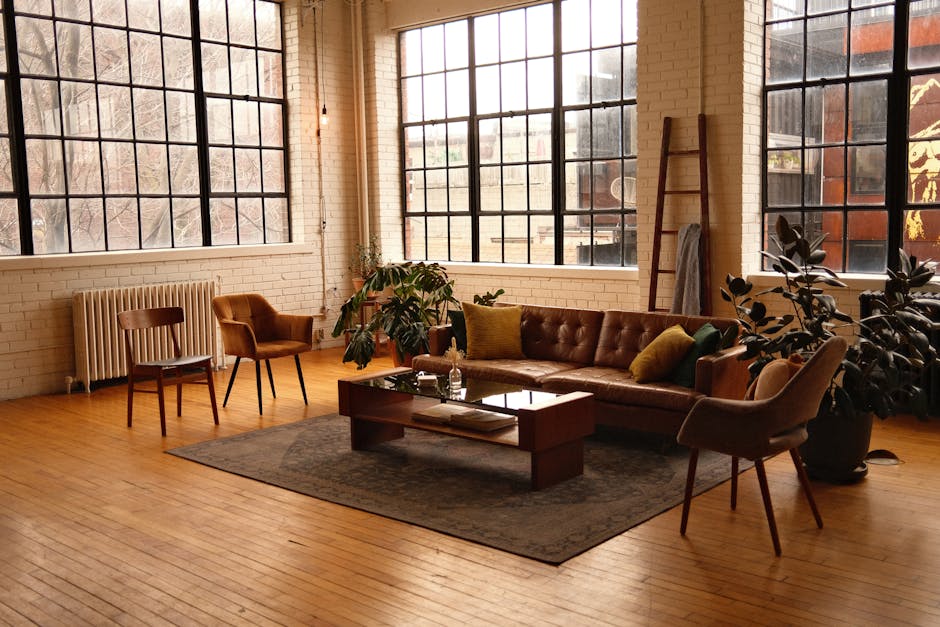
Types & Sizes Available for Delivery
The world of prebuilt homes delivered has expanded dramatically in recent years. Today’s options go far beyond the basic rectangular boxes of the past, with sizes and styles to match almost any vision you have for your home.
Single-wide manufactured homes provide an affordable entry point to homeownership. Typically 14-18 feet wide and ranging from 600-1,200 square feet, these homes arrive in one complete section. Starting around $25,999, they’re perfect for singles, couples, or small families looking for an efficient living space without breaking the bank.
For growing families needing more room to spread out, double-wide manufactured homes offer 1,000-2,500 square feet of living space. These homes arrive in two sections that are joined together on-site, creating a spacious 28-32 foot wide home. Prices start around $39,199, offering tremendous value per square foot compared to traditional construction.
Looking for something truly spacious? Multi-section modular homes can reach 4,000+ square feet, arriving in multiple sections that create impressive custom homes once assembled. These higher-end options start around $60,000 and can include luxury features that rival any site-built home.
Innovation in the industry has introduced expandable and foldable units that maximize space efficiency during transport. These clever designs unfold or expand after delivery, creating 300-1,200 square feet of living space. They’re particularly valuable for remote locations with difficult access.
The tiny home movement has influenced the industry too, with tiny homes and park models offering 100-500 square feet of highly efficient living space. Often built on trailer frames for mobility, these compact homes are increasingly popular as backyard dwellings or guest quarters.
For those seeking something truly different, specialty designs like yurts (circular structures inspired by Mongolian traditions), aerodynamic round homes built to withstand hurricanes, repurposed shipping container homes, and rustic cabin styles offer unique alternatives to conventional housing.
At Manufactured Housing Consultants, we’ve noticed growing interest in accessory dwelling units (ADUs) as families look for ways to accommodate aging parents or generate rental income. These smaller units can be placed on properties with existing homes, subject to local zoning regulations.
“Building the right sized home to fit your needs is smarter, less expensive, simpler and better for the environment,” notes one industry expert. This practical philosophy guides many of our customers toward choosing appropriately-sized prebuilt homes delivered rather than overbuilding.
Materials, Efficiency & Durability
When your prebuilt home delivered arrives at your property, you’re getting construction that often exceeds what you’d find in traditional site-built homes. Today’s factory-built housing uses advanced materials and techniques that create durable, energy-efficient living spaces.
The backbone of any home is its structural system. Many higher-end modular homes use hot-dipped galvanized steel framing that resists warping, cracking, and pests. This steel provides exceptional strength and longevity compared to traditional lumber.
Other homes feature precision-cut wood framing using 2×4 or 2×6 lumber. The factory setting allows for exact measurements and cuts, reducing waste and ensuring tight, solid construction.
For superior insulation and structural integrity, many manufacturers use Structural Insulated Panels (SIPs) – high-performance building panels with an insulating foam core sandwiched between two structural facings. As one Texas prefab builder enthusiastically shares, “We build with SIPs which is even better than traditional construction!”
Similar in concept, sandwich panels provide excellent insulation and structural strength using various material combinations, creating homes that stay comfortable while using less energy.
The energy efficiency of today’s prebuilt homes delivered would surprise most people. Standard features often include R-4.8 insulation (or higher) in walls, roofs, and floors; Energy Star rated appliances and HVAC systems; high-performance windows with low-E coatings; LED lighting throughout; and smart home technology that optimizes climate control.
“In my opinion, the quality of construction is higher than normal built homes. The subs love working on these prefab homes because everything is straight and square,” says Kory Goodwin of Streamline Construction.
For those in areas prone to extreme weather, many prebuilt homes delivered today are engineered specifically for challenging conditions. Some models are rated “Level 12 Typhoon Resistant,” while others incorporate fire-resistant materials and construction techniques. Innovative designs like Deltec’s round homes feature aerodynamic shapes that can withstand hurricane-force winds.
The environmental benefits extend beyond energy efficiency. The factory building process inherently creates less waste than site-built construction. Many manufacturers offer net-zero energy options with integrated solar systems, off-grid capability with battery storage, sustainable building materials, and water-saving fixtures.
Some cutting-edge manufacturers have even integrated comprehensive monitoring systems – one collects over 4 million data points monthly through smart home systems to monitor and optimize energy usage and indoor air quality. This level of performance tracking is rarely seen in traditional construction but comes standard in some of today’s advanced prebuilt homes delivered.
Pricing, Financing & Cost Drivers
When shopping for prebuilt homes delivered, understanding the true cost involves looking beyond the advertised base price. Let’s break down what actually affects your total investment.
The base price of your home depends on several factors: the size and floor plan (more square footage means higher cost), standard features and finishes included, the manufacturer and quality tier you choose, and current material costs in the market.
At Manufactured Housing Consultants, our single-wide 3-bedroom/2-bathroom models start at $25,999, while double-wides begin at $39,199. If you’re looking for larger, more luxurious options with premium features, prices can range up to $176,568 or more.
But the base price is just the beginning of the story. Delivery and set-up costs include transportation fees (which vary based on distance), crane or special equipment rental, labor for the set crew, and finishing work where sections join together (called the “marriage line”).
Site preparation is another significant cost factor. This includes your foundation (whether slab, crawlspace, or basement), connecting utilities (water, sewer, electric, and gas), preparing the land with proper grading and drainage, and sometimes improving access roads if your property is remote.
Don’t forget permits and fees! Building permits, impact fees, inspection fees, and utility connection charges vary by location but are necessary expenses.
Customization and upgrades can significantly impact your final price. Premium finishes and fixtures, additional features like decks or porches, energy efficiency upgrades, and smart home technology all add to the bottom line.
“You save the most money possible on your new modular home build when you coordinate all the site work and get your prebuilt home delivered from the manufacturer,” advises one industry expert. This “Home-Only” approach can save thousands for those willing to manage their own site work.
Financing prebuilt homes delivered works differently depending on the type of home you choose. Manufactured homes can be financed with chattel loans (personal property) or, when permanently installed on owned land, traditional mortgages including FHA, VA, and conventional loans. Modular homes typically qualify for the same financing as site-built homes, including construction-to-permanent loans.
At Manufactured Housing Consultants, we specialize in helping customers with various credit situations find financing solutions that work. Our TIN (Tax Identification Number) financing on 3 and 4-bedroom units has helped many families achieve homeownership when traditional lending wasn’t an option.
Want to save on costs? Consider a “Home-Only” delivery option and coordinate site work yourself. Start with a standard floor plan and limit customizations. Choose energy-efficient features that will reduce your long-term operating costs. Take advantage of manufacturer promotions and incentives. And don’t forget our $400 Less Guarantee, which promises to beat any competitor’s price by $400!
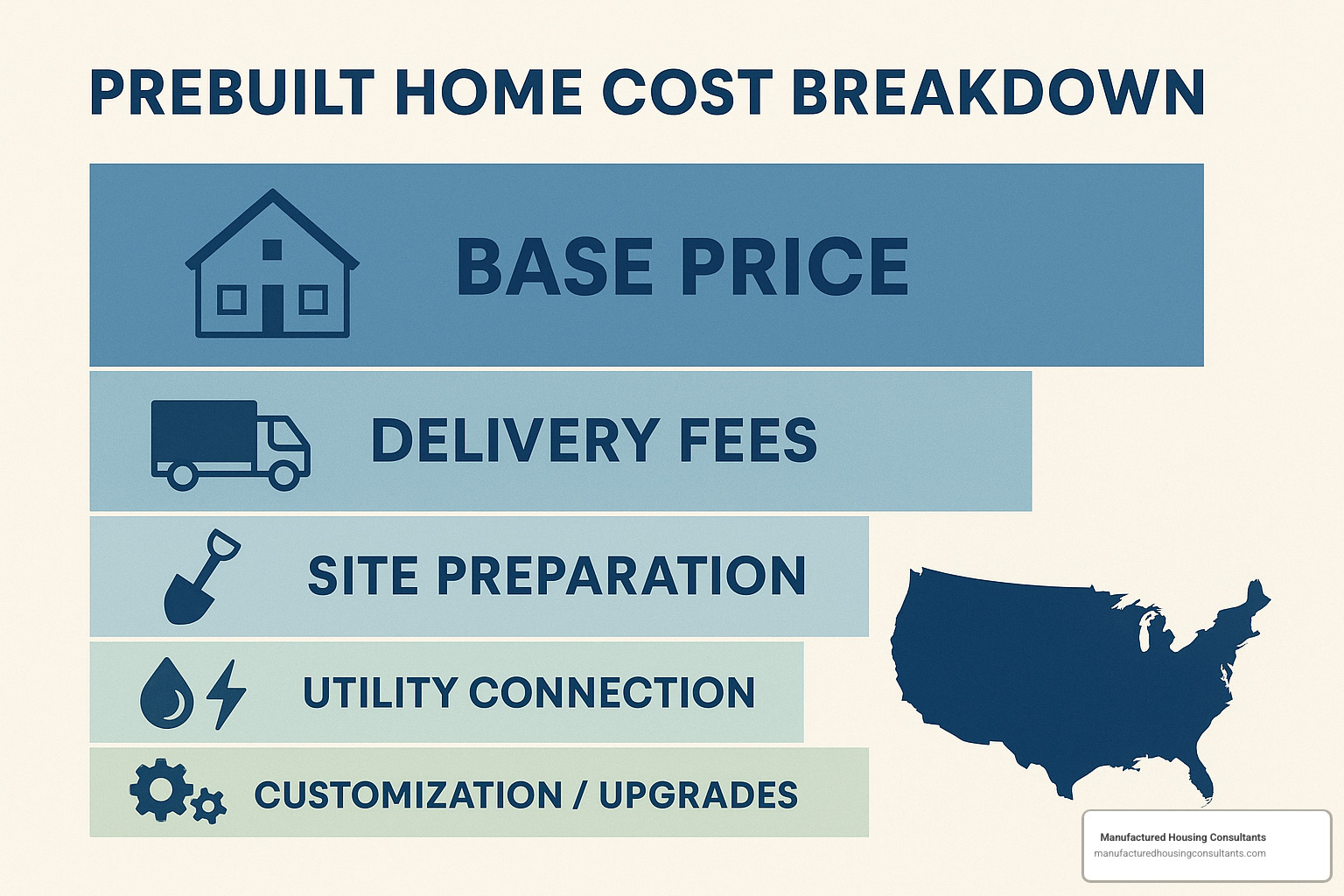
Customization & What’s Included Inside
The days when prebuilt homes delivered meant cookie-cutter boxes with limited options are long gone. Today’s factory-built homes offer customization possibilities that rival or even exceed those of traditional construction, allowing you to create a home that truly reflects your personal style and needs.
When your home arrives, it typically includes kitchen cabinets and countertops, bathroom fixtures including toilet, sink, and shower or tub, flooring throughout (usually carpet, vinyl, or laminate), interior doors and trim, lighting fixtures, appliance hookups, heating and cooling systems, electrical outlets and switches, and insulation. But that’s just the starting point.
The kitchen is often the heart of the home, and manufacturers offer numerous upgrade packages. You can choose from various cabinet options, selecting different wood species, door styles, and finishes to match your taste. Countertop choices range from basic laminate to luxurious granite or quartz. Add a custom backsplash, upgrade to premium appliances, incorporate an island, or design a custom pantry configuration.
Bathrooms can be transformed from basic to spa-like with upgraded shower and tub options ranging from fiberglass to custom tile work. Select from various vanity styles and sizes, add smart toilets or bidets, upgrade lighting and mirrors, or opt for premium tile flooring.
Climate control and energy systems represent another area where customization can improve comfort and efficiency. Options include mini-split systems (like Bryant), tankless water heaters for unlimited hot water, integrated solar panels, battery storage systems for energy independence, and smart thermostats for remote control and optimization.
The exterior of your home offers plenty of customization opportunities too. Choose from different siding materials and colors, select roofing options that complement your design, upgrade window styles and energy ratings, add porches, decks, or balconies, attach a garage, or improve curb appeal with exterior lighting.
Smart home technology integration has become increasingly popular. Home automation systems, security features, energy monitoring, and remote control capabilities can all be incorporated into your prebuilt home delivered.
As one of our delighted customers shared, “We were amazed at how much we could customize our home. It doesn’t look or feel like what people think of when they hear ‘manufactured home’—it’s beautiful, solid, and exactly what we wanted.”
Your new home will typically come with comprehensive warranty coverage. Most manufacturers offer a 1-year comprehensive warranty covering materials and workmanship, longer structural warranties (typically 5-10 years), manufacturer-specific warranties on appliances and systems, and some companies even offer lifetime warranties on major home systems.
At Manufactured Housing Consultants, we believe in complete transparency regarding what’s included in your base price versus what costs extra. Our detailed quotes break down every component so you can make informed decisions about where to invest in upgrades and where to save.
For Texas homeowners specifically, popular add-ons include covered porches (a virtual necessity for our hot summers), improved insulation packages for energy efficiency in our climate, storm-resistant features for coastal areas, upgraded HVAC systems sized for our scorching summers, and stone exterior accents that complement the Texas aesthetic.
Prebuilt Homes Delivered: From Factory to Foundation
Ordering & Lead Times for Prebuilt Homes Delivered
Bringing your dream home to life begins with a simple order, but there’s a whole journey from clicking “buy” to watching your new house arrive on a truck. The good news? It’s much faster than you might think!
When you’re ready to order your prebuilt home delivered to your property, the process starts with exploration. You can browse floor plans on our website, or better yet, visit our San Antonio showroom where you can walk through actual models and get a real feel for the spaces. There’s nothing quite like standing in a kitchen to know if it’s right for you!
Once you’ve fallen in love with a design, our consultants help you personalize it. Want granite countertops instead of laminate? Need an extra window in the master bedroom? This is where your home truly becomes yours. After finalizing your selections, we provide a detailed quote that breaks down every cost—no surprises here! With your approval and deposit (typically 10-25% of the total), we get the wheels in motion.
Behind the scenes, our team creates detailed construction plans for your approval and submits them to local building authorities. Once permits are secured, your home enters the production queue at the factory, where the magic happens.
“We’re often amazed at how quickly our homes come together once they hit the production line,” shares one of our project managers. “The controlled environment makes such a difference in both quality and speed.”
How long will you wait for your prebuilt home delivered? It depends on several factors:
If you’re in a hurry, we sometimes have inventory homes ready to ship in as little as 1-2 weeks—these are fully built and just waiting for a happy owner. For standard manufactured homes with minimal customization, expect 4-8 weeks from order to delivery. More complex modular homes with significant customization typically take 8-16 weeks.
When you factor in site work, foundation, and complete setup, the total timeline for a full turn-key project usually ranges from 3-9 months—still dramatically faster than the 9-18 months typically required for traditional construction.
One of our manufacturer partners proudly notes, “We are known for our 6-week builds,” while another has set an ambitious goal “to decrease this timeline to 18 weeks, based on permit timelines.” The industry is constantly improving efficiency without sacrificing quality.
Throughout the waiting period, we keep you connected to your home’s progress. Many manufacturers now provide online portals where you can track production milestones, view photos as your home takes shape, communicate with your project manager, and manage documentation. It’s a bit like tracking a package—except this one will be your new home!
Delivery, Shipping Fees & Permit Checklist for Prebuilt Homes Delivered
Delivery day is when the excitement really builds! There’s something magical about watching your home arrive on the back of a truck (or several trucks for larger homes). But before that can happen, there’s important groundwork to lay.
Prebuilt homes delivered to your property arrive via specialized tractor-trailers, with escort vehicles for oversized loads. The logistics require careful choreography—route planning to avoid low bridges and power lines, coordination with set crews and crane operators, and weather considerations (nobody wants their new home caught in a downpour during installation).
“The day our home arrived was like a neighborhood event,” laughs Maria, one of our San Antonio customers. “Everyone on the street came out to watch the crane lift our modules into place. It was better than a block party!”
Delivery costs vary based on several factors: distance from the factory to your site, number of sections being transported, permits required for oversized loads, and whether you’re in a rural area with difficult access. At Manufactured Housing Consultants, we pride ourselves on transparent pricing with no hidden fees. Our statewide delivery network serves customers throughout Texas—from San Antonio to Corpus Christi, Laredo, Victoria, and beyond.
Before delivery day arrives, you’ll need to check off several permits and approvals. Think of it as your pre-delivery homework:
First, you’ll need a building permit, which requires submitting the manufacturer’s plans to your local building department. You’ll also need to confirm your property is properly zoned for manufactured or modular housing—this is especially important in certain Texas counties with specific regulations.
For rural properties, a septic system permit is typically required, while urban homes need sewer connection permits. Similarly, you’ll need water connection permits (municipal or well), electrical service permits, and often a driveway/culvert permit if creating a new access point from a public road.
“How can you make a decision on purchasing a home if you don’t have all the facts?” asks one of our Texas dealers, highlighting why we offer free site inspections to identify any potential issues with access, utilities, or zoning that could affect your prebuilt home delivery. Our experienced team guides you through the permit process or connects you with resources to steer these requirements.
Your site also needs proper preparation before the big day: clearing obstacles like trees and debris, grading for proper drainage, ensuring access for large delivery vehicles, preparing the appropriate foundation, and marking utility connection points. It’s like setting the stage for the main event—your home’s arrival.
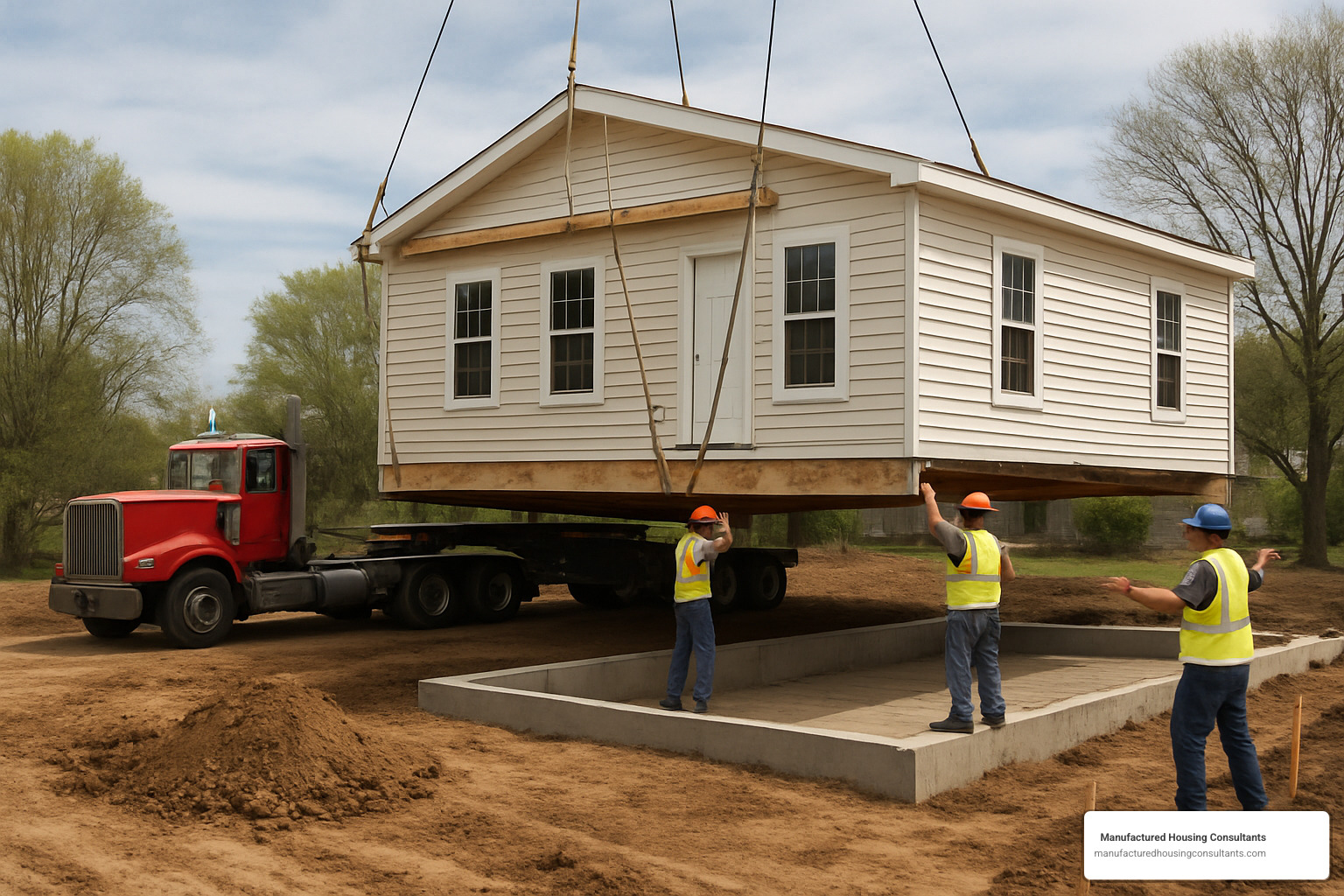
On-Site Assembly & Final Setup Steps
The day your prebuilt home arrives transforms your empty lot into a homesite in a matter of hours. What was once just a foundation suddenly becomes a structure with walls, windows, and a roof. It’s one of the most exciting days in your homeownership journey!
Before this change can happen, you need the right foundation. In Texas, concrete slabs are particularly popular due to their termite resistance and simplicity—perfect for our climate and soil conditions. For sloped sites, pier and beam foundations work well, providing good ventilation underneath the home. Crawlspaces offer similar benefits but with an enclosed perimeter wall that protects utilities and provides some storage space.
While less common in Texas due to our soil conditions, basements are possible for modular homes and add valuable square footage. Some innovative designs even use adjustable concrete feet, as one manufacturer explains: “Adjustable concrete feet allow installation without traditional foundations,” giving you flexibility on certain terrains.
When delivery day arrives, specialized trailers bring your home’s sections to your property. Using either a crane or roller systems, these sections are carefully positioned onto your prepared foundation. Precision is essential here—each section must align perfectly according to engineering specifications.
The real magic happens at the “marriage lines” where sections join together. Skilled crews secure the structural connections, complete the roof over these connection points, and begin interior finishing at the seams. One of our customers described it as “watching a puzzle come together, except this puzzle becomes your home.”
Next comes the critical utility work: connecting electrical systems to power sources, hooking up plumbing to water and sewer/septic lines, completing HVAC systems, and connecting gas lines if your home uses them. This is followed by interior finishing—completing drywall at marriage lines, finishing flooring across seams, installing interior trim, and touching up paint.
The exterior gets similar attention with siding finished at connection points, roof completion, installation of steps, porches or decks, and attachment of gutters and downspouts. While some smaller homes like yurts can be assembled in a weekend, most prebuilt homes delivered require 1-4 weeks for complete setup and finishing, depending on size and complexity.
Before you can move in, your newly assembled home must pass several inspections: foundation, structural, electrical, plumbing, mechanical, and a final comprehensive review before receiving a certificate of occupancy. At Manufactured Housing Consultants, we coordinate with local inspectors throughout this process. Our experienced set crews understand Texas building codes inside and out, helping your home pass inspection the first time.
While some handy homeowners might be tempted to handle the entire setup themselves, we recommend professional installation for critical elements like structural connections between modules, utility hookups, foundation attachment, and roof completion. Our “Home-Only” option offers a middle ground, allowing you to complete some finishing work yourself while leaving these crucial connections to professionals—saving money without compromising safety.
Pros, Cons & Common Uses
Let’s have an honest conversation about prebuilt homes delivered to your property. Like any major life decision, choosing a factory-built home comes with tremendous benefits and a few considerations worth weighing.
The advantages of choosing a prebuilt home are substantial. Perhaps most appealing is the speed of construction. While your neighbors might wait a year or more for their site-built home, your factory-built home can reduce that timeline by 50-60%. As one manufacturer proudly points out, “Prefab homes require 60% less framing time than an on-site built home.” When Texas families need housing quickly, this difference matters enormously.
The cost efficiency is another major draw. The controlled manufacturing environment significantly reduces labor costs and material waste. Workers in factories become specialists at specific tasks, improving both quality and efficiency. Plus, bulk purchasing of materials creates savings that get passed on to you.
Quality control reaches levels difficult to achieve with site-built construction. Each home moves through multiple inspection stations before leaving the factory, with issues addressed immediately rather than finded months later. This controlled environment also means your home’s components are never exposed to rain, snow, or extreme temperatures during construction.
Many modern prebuilt homes delivered today feature impressive weather resistance, with some engineered to withstand Level 12 typhoons or hurricane-force winds—particularly important in parts of Texas vulnerable to severe weather. Their energy efficiency often exceeds code requirements, with advanced insulation techniques and tight construction that can significantly reduce your monthly utility bills.
The predictable pricing provides peace of mind that’s rare in traditional construction. Fixed contracts mean you’re less likely to face the surprise costs and budget overruns that plague many stick-built projects. Your home also causes reduced site disruption—minimal on-site construction means less impact on your land and neighbors, preserving more of your property’s natural features.
Of course, no housing option is perfect. Transportation creates some limitations on home size due to road width and height restrictions, though creative multi-section designs can overcome many of these constraints. Some areas have zoning restrictions on manufactured homes, though modular homes typically face fewer problems since they’re built to the same codes as site-built homes.
Your property needs adequate access for delivery vehicles and appropriate foundation options, which can be challenging for some remote or heavily wooded lots. While today’s homes are highly customizable, there are physical boundaries to customization based on what can be safely transported.
Some buyers still worry about perception issues, associating manufactured homes with older mobile homes, though this stigma is rapidly fading as people see the quality of modern factory-built homes. And while resale considerations vary by region, well-maintained manufactured homes on permanent foundations increasingly hold their value similarly to traditional homes in many Texas markets.
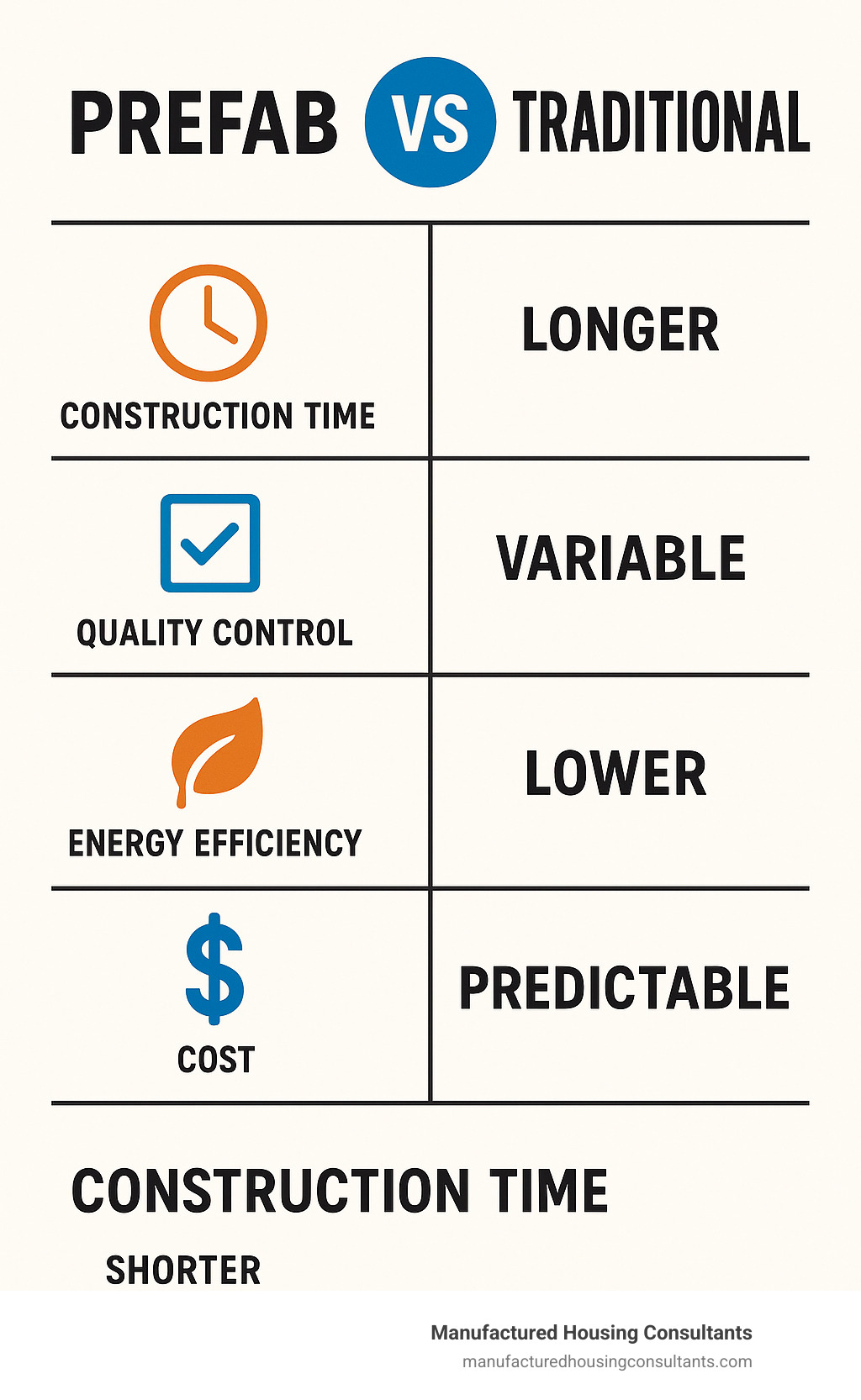
Prebuilt homes delivered serve diverse needs beyond just primary residences. They make perfect vacation homes, with faster construction timelines allowing owners to enjoy their getaways sooner rather than later. Smaller units work beautifully as Accessory Dwelling Units (ADUs), which one customer, Justin, explains are “allowing us to provide housing for more people and have family closer to us.” These versatile spaces serve as in-law suites, rental income generators, home offices, or guest accommodations.
In rural and remote areas of Texas, factory-built homes solve the challenge of getting construction crews and materials to isolated sites. Companies increasingly use modular solutions for workforce housing in areas with housing shortages. “We contracted with Zip Kit Homes to build eight 2-bedroom modular units for employee housing,” reports one satisfied business owner.
When natural disasters strike, the speed of deployment makes prebuilt homes valuable for disaster recovery. And for those looking at housing as an investment, the predictable costs and quick completion make manufactured homes attractive investment properties in Texas’s growing rental market.
Whether you’re a first-time homebuyer, downsizing retiree, or investor looking for rental properties, there’s likely a prebuilt home delivered solution that fits your needs—and your budget—perfectly.
Conclusion & Your Next Move
The journey to owning a prebuilt home delivered to your property is more accessible than ever before. As we’ve explored throughout this guide, factory-built homes offer compelling advantages in terms of speed, quality control, energy efficiency, and cost-effectiveness.
At Manufactured Housing Consultants, we’re committed to helping Texas families find their perfect prebuilt home solution. Our guaranteed lowest prices and ability to deliver anywhere in Texas make us the ideal partner for your housing journey.
Your Next Steps Checklist:
- Assess Your Needs and Budget
- Determine your space requirements and must-have features
- Calculate your comfortable budget range
- Consider future needs (family growth, aging in place)
- Explore Home Options
- Browse our extensive catalog of manufactured and modular homes
- Visit our showrooms in San Antonio, New Braunfels, or other Texas locations
- Schedule virtual tours of models that interest you
- Evaluate Your Land
- If you own land, request our free site inspection
- If you need land, ask about our available properties or recommendations
- Consider access, utilities, and zoning requirements
- Secure Financing
- Apply for pre-approval to understand your buying power
- Explore our financing options for various credit situations
- Consider our TIN financing for 3 and 4-bedroom units if traditional financing is challenging
- Customize Your Home
- Select your floor plan and exterior design
- Choose interior finishes and features
- Add energy-efficient options for Texas climate
- Prepare for Delivery
- Obtain necessary permits
- Complete foundation work
- Arrange for utility connections
- Coordinate Delivery and Setup
- Schedule delivery date
- Arrange for professional setup
- Plan for final inspections
“That’s our house! They built us a beautiful home,” shares Teresa, one of our satisfied customers. Your story could be next.
The housing market continues to challenge many Texans with high prices and limited inventory. Prebuilt homes delivered offer a practical solution that doesn’t sacrifice quality or comfort. With options ranging from affordable single-wides starting at $25,999 to spacious luxury homes, there’s a factory-built home for nearly every budget and lifestyle.
Our family-owned dealership is ready to help your family every step of the way. With locations across Texas, including San Antonio, New Braunfels, Laredo, Corpus Christi, Victoria, and Von Ormy, we’re never far from where you want to build.

Remember our $400 Less Guarantee: if you find the same home at a lower price elsewhere, we’ll beat it by $400. That’s our commitment to offering the best value in Texas.
Ready to start your journey to an affordable, quality home? Contact Manufactured Housing Consultants today or visit one of our locations. Your dream home awaits, and it could be delivered sooner than you think.
Additional Resources:
- Modern Modular Housing
- Guide on Modular House Cost
- Our Services: Site Preparation
- Our Services: Utility Connections
- More info about modular homes
- U.S. Department of Energy – Building Technologies Office

